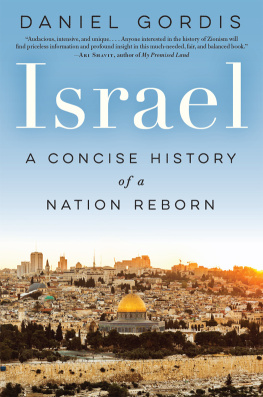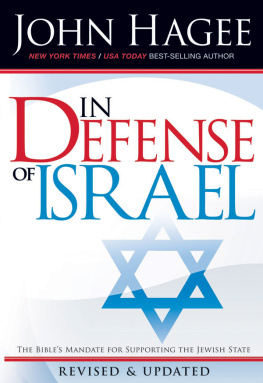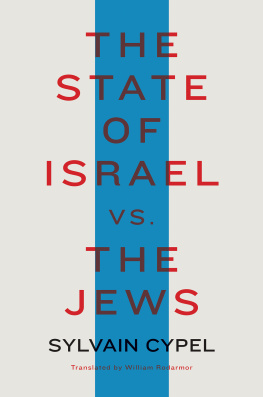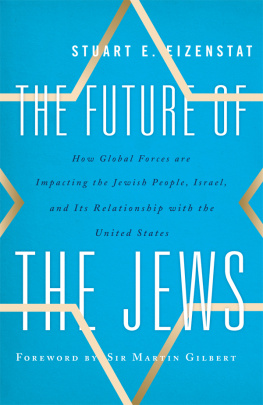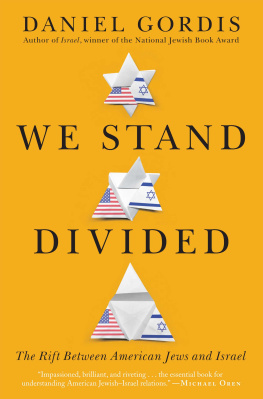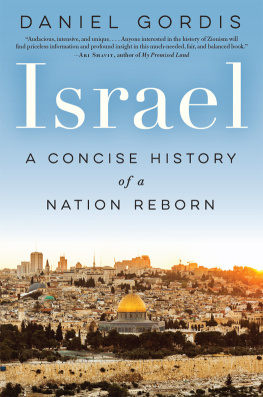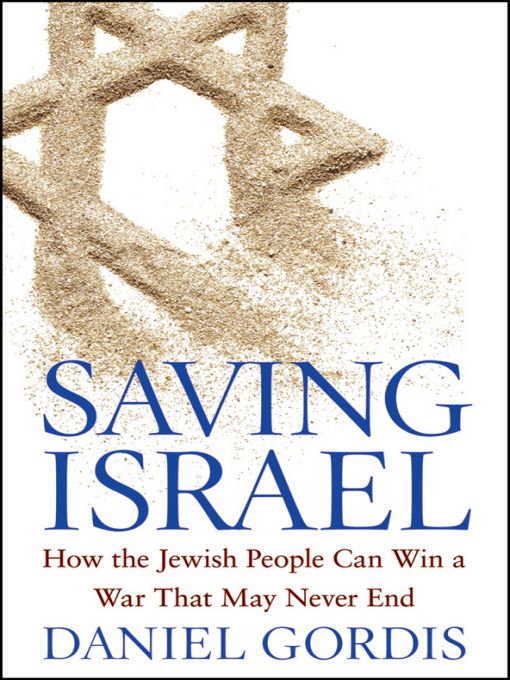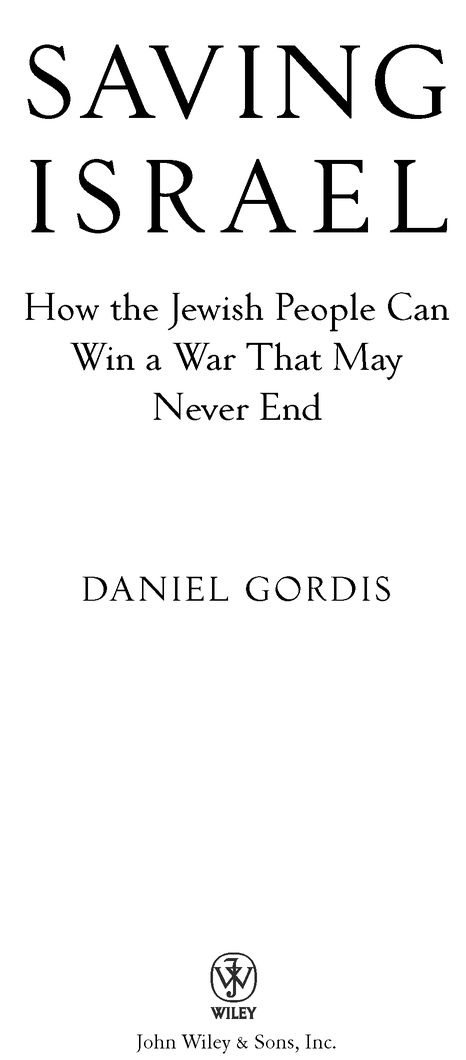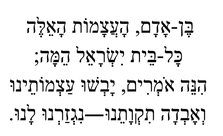Table of Contents
Also by Daniel Gordis
God Was Not in the Fire:
The Search for a Spiritual Judaism
Does the World Need the Jews?
Rethinking Chosenness and American Jewish Identity
Becoming a Jewish Parent:
How to Explore Spirituality and Tradition with Your Children
If a Place Can Make You Cry:
Dispatches from an Anxious State
Home to Stay:
One American Familys Chronicle
of Miracles and Struggles in Contemporary Israel
Coming Together, Coming Apart:
A Memoir of Heartbreak and Promise in Israel
In memory of
Professor Seymour Fox,

Teacher, mentor, and cherished friend
who brought us here
and changed the course of our lives
O mortal, these bones are
the whole House of Israel.
They say, Our bones are dried up,
our hope is lost; we are doomed.
Ezekiel 37:11
Our hope is not yet lost,
The hope of two thousand years
To be a free people in our land.
Hatikvah, Israels national anthem
ISRAEL, POST EUPHORIA
Who is wise?
The one who can foresee consequences.
Babylonian Talmud
In the summer of 2007, Avrum Burg, scion of a distinguished Israeli political family, a former speaker of the Knesset, a former chairman of the Jewish Agency, and a man widely acknowledged in Israel as possessing both a prodigious intellect and a promising political future, published his controversial book, Victory Over Hitler. In it he claimed that to define the State of Israel as a Jewish state is the key to its end. A Jewish state is explosive. Its dynamite. Burg, once seen as a possible future leader of Israels long-dominant Labor Party, doubted that a Jewish democratic state could survive. In a postpublication interview with Israels most elite daily newspaper, he urged Israelis to obtain foreign passports, presumbly to prepare to leave.
Ironically, Burgs book appeared almost forty years to the day after the end of the Six Day War. That war had left Israelis feeling triumphant and invincible; it had seemed to set aside for once and for all the question of whether the Jewish state could survive.
In the days prior to June 1967, it was far from clear that Israel would survive. In the period now called the
hamtanah, the waiting, Israelis were beyond worried, preparing for the worst. Amassing its army and saber rattling, Egypt lay to the south. To the east, Israel faced Jordan, and to the north, Syria and Lebanon. All had vowed to destroy the Jewish state. As historian Michael Oren recounts in his masterful best-seller,
Six Days of War:Throughout the country, thousands were hurrying to dig trenches, build shelters, and fill sandbags. In Jerusalem ... schools were refitted as bomb shelters, and air raid drills were practiced daily.... An urgent request for surgeons ... was submitted to the Red Cross, and extra units of plasma ordered from abroad.... Upwards of 14,000 hospital beds were readied, and antidotes stockpiled for poison gas victims, expected to arrive in waves of 200. Some 10,000 graves were dug.
But the doomsday scenarios never materialized. In a lightning preemptive strike, Israeli jets destroyed Egypts air force just hours before it would have attacked the Jewish state, and the Israel Defense Forces captured the Sinai Peninsula and the Gaza Strip from Egyptian forces. From Syria, Israel took the strategically critical Golan Heights. From Jordan, which ignored Israels warnings to stay out of the war and foolishly joined the fray, the IDF seized the West Bank of the Jordan River and the eastern half of Jerusalem. In six quick days, Israel tripled its size, from 8,000 to 26,000 square miles.
Finally Israel seemed to be out of danger. True, at the Khartoum conference three months after the war, Israels Arab enemies still insisted that there would be no peace, no recognition and no negotiations with Israel, but neither Israelis nor American Jews paid much attention to the bluster of Khartoum. At long last, Jews worldwide felt secure. Israel seemed invincible. From America to the Soviet Union, a new pride in Israeland in being Jewishbegan to emerge. American Jews came out of the woodwork as they never had before, and Soviet Jews began what would become a relentless campaign to receive permission to emigrate.
Finally it seemed that the Shoah and its threats had been relegated to the past. The Jews had an indestructible home; from now on, they would no longer be slaughtered at the whim of others. Everything had changed. The Jewish future appeared brighter than it had in hundreds of years.
And the reason for that bright future was the State of Israel.
But within a decade or two, a new challenge arose. Now the Palestinians insisted that they, too, deserved a state. (For our purposes, we will ignore the raging debate as to whether the Palestinians are, in fact, a nation, and why and how their nationalism was created. The world accepts the argument that they are a nation, as do many Israelis, and that is the fact that Israel must reckon with.) After initial resistance, some Israelis and many American supporters of Israel began to view this nascent Palestinian nationalism as something akin to the American civil-rights movementit was a movement representing people who had not received their due, who simply wanted to be treated fairly. African Americans wanted equal pay and social access, just like whites had. And Palestinians only wanted statehood, just like the Jews had. Despite a few high-profile Palestinians committed to terror and to Israels destruction, Palestinian nationalism was essentially about human rights. Given a chance to realize their dreams, they would make the accommodations necessary to live beside the Jewish state.
Or so it seemed. Decades later, we know that that assessment was wildly optimistic. Rather than being a civil-rights movement with a terrorist element, Palestinian nationalism has proved itself a terror-based movement dressed in civil-rights garb. By and large, Palestinian leadership is sadly much more intent on destroying Israel than on working toward statehood and a better life for the Palestinian rank and file. Those people who had believed that territorial accommodation would bring the conflict to an end were sadly proven wrong.
But Americans and Israelis refused to give up. In 2000, President Bill Clinton invited Israeli prime minister Ehud Barak and Palestinian chairman Yassir Arafat to Camp David for meetings that were designed to achieve a long-term settlement between the warring parties. According to Ambassador Dennis Ross, who served as Clintons point man on the peace process during that period, Barak made far-reaching concessions on both territory and security. But the talks collapsed in July 2000, and two months later, war erupted.


